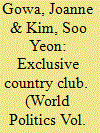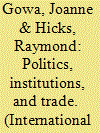| Srl | Item |
| 1 |
ID:
070215


|
|
|
| 2 |
ID:
002492


|
|
|
|
|
| Publication |
Philadelphia, Foreign Policy Research Institute, 1982.
|
| Description |
xi,104p.
|
| Series |
Philadelphia policy papers
|
|
|
|
|
|
|
|
|
|
|
|
Copies: C:1/I:0,R:0,Q:0
Circulation
| Accession# | Call# | Current Location | Status | Policy | Location |
| 033941 | 327.73047/GOW 033941 | Main | On Shelf | General | |
|
|
|
|
| 3 |
ID:
154541


|
|
|
|
|
| Summary/Abstract |
That the anarchic system generates incentives for states to balance each other's power is conventional wisdom in international relations. As such, the contemporary unipolar system is an anomaly. Observers explain its existence in several ways, including the benevolence of US hegemony and the constraints international institutions impose on the exercise of US power. None of them, however, explain what is perhaps the most puzzling outcome of the Soviet collapse: the decision of the United States to maintain its level of military spending. To explain its choice, we extend the seminal argument Waltz advanced long ago to a dynamic setting. Using a simple model, we show that the interest of the unipole in deterring a challenge to its power can induce it to continue to invest in guns rather than to shift its resources to the production of butter. This strategy can enable the incumbent unipole to pre-empt the balancing process that has long been thought to be central to state survival under anarchy.
|
|
|
|
|
|
|
|
|
|
|
|
|
|
|
|
| 4 |
ID:
123014


|
|
|
|
|
| Publication |
2013.
|
| Summary/Abstract |
Recent studies cast doubt on the value added of international trade agreements and institutions. Using a new data set that consists of about 35,000 observations on the trade of fifty-four nations between 1919 and 1938, we examine whether this skepticism also applies to the infamous interwar trade blocs. Traditional historical accounts attribute to them a large drop in international trade and a rise in the political tensions that would later erupt in World War II. In this study, we show that no bloc raised trade among its members as a whole or decreased trade between members and nonmembers. However, our findings are not wholly consistent with the skepticism recent studies express. We argue that conflicts of interest among the great powers encouraged the emergence of the bloc system and also gave rise to intrabloc trade shifts consistent with the political interests of their great-power hubs. The political-military alliances these conflicts created also reduced trade between their signatories, and we argue more generally that the causal chain runs from politics to trade. As a result, measuring only the effect of agreements and institutions on aggregate trade between their members can generate inaccurate estimates of their value added.
|
|
|
|
|
|
|
|
|
|
|
|
|
|
|
|